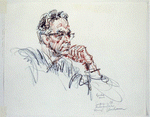Posted on August 8, 2005
Dead Precedents
"Living Constitution" yields stillborn rulings
by
Daniel Clark
Of all the lies that legalized abortion has required, one of the most odious is the Supreme Court's declaration that it is a "fundamental constitutional right," when anybody can see that it has no constitutional foundation whatsoever.

The very idea of a "fundamental" constitutional right is antithetical to the "living Constitution" theory that produced Roe v. Wade. If the Constitution is a "living document" that is constantly, spontaneously amending itself, then the meanings of Supreme Court rulings that derive from it cannot remain static. To contend that the Roe decision, while structured on an amorphous legal basis, is "settled law" and therefore irreversible is like pitching a tent in quicksand and declaring it to be a historic landmark.
If liberals take it upon themselves to discard plainly written constitutional language, like that of the Second Amendment, on the basis that it is a product of its time and is not applicable to today's world, then who's to say that a ruling handed down in 1973 still has any relevance either? That ought to seem like a fair question to anyone who subscribes to the "living document" theory, yet many Senate Democrats are determined to reject Supreme Court nominee John Roberts, unless he is willing to pronounce Roe v. Wade to be sacrosanct. You see, parts of the Constitution may wither and drop away, but nothing is ever allowed to change in the petrified forest of activist Court precedent.

Justice Harry Blackmun, who wrote the majority opinion in Roe, conceded that "[t]he Constitution does not explicitly mention any right to privacy." However, he did cite previous Court rulings that he said "found at least the root of those rights" in the First, Fourth, Fifth, Ninth and Fourteenth Amendments, as well as the "penumbras" (i.e., shadowy areas) of the Constitution. (No wonder Blackmun found a right to abortion there. That must be the Constitution's red-light district.) If the "root" of a right to abortion exists in our founding document, then it ought to be rooted in solid enough ground for Blackmun to pick up a clump of it and show it to us. To the contrary, he left himself grasping at air.
How Blackmun's shapeless concept of "privacy" came to be synonymous with abortion should have required far more explanation than it received in Roe. There, he declared that, "This right to privacy ... is broad enough to encompass a woman's decision whether or not to terminate a pregnancy." How did he know this? Because, "Maternity, or additional offspring, may force upon a woman a distressful life and future. Psychological harm may be imminent. Mental and physical health may be taxed by child care. There is also the distress, for all concerned, associated with the unwanted child, and there is the problem of bringing a child into a family already unable, psychologically and otherwise, to care for it."
Imagine if somebody had shown up at the Constitutional Congress and proposed that people have a fundamental right to be free of stress. Our founding fathers would have laughed him right out of the hall. But what did they know? The Constitution they drafted is a mere mortal, compared to the cryogenically suspended opinions of liberal judicial activists like Justice Blackmun.

If there is any legal document that's full of penumbras, it's Roe v. Wade itself, a ruling not exactly renowned for its clarity. For a Supreme Court opinion to sanction the destruction of unborn human beings while at the same time shrugging that, "We need not resolve the difficult question of when life begins" would be comical, if not for its approximately 46 million victims.
Not only isn't Roe set in granite, but most of its supporters would be alarmed to know that it actually invites its own revision. "If this suggestion of personhood is established," Blackmun wrote, "the appellant's [counsel for Roe's] case, of course, collapses, for the fetus' right to life would then be guaranteed specifically by the [Fourteenth] Amendment." He then illogically used the Constitution's lack of any explicit mention of life before birth as proof that the word "person" in the Fourteenth Amendment does not include the unborn. But how could he know for sure, without resolving "the difficult question of when life begins?"
Luckily for him, the author of a majority Supreme Court opinion never has to explain himself. As long as at least four other justices are willing to concur with him, he can be as creative as he wants in justifying the outcome. The Court had decided before ever hearing Roe that it was going to legalize abortion on demand. As long as Blackmun reached that conclusion, the incoherence of his premises didn't matter. Since the decision was favored by "living Constitution" proponents, that means it is now "settled law" and must not be questioned.
If Judge Roberts were to even suggest that such a decision be opened up and re-examined, the Democrats would use that as justification to filibuster his nomination, or worse. Guided by the belief, right or wrong, that Roberts is the man who's going to drive a stake through their "living Constitution," liberals are already beginning a smear campaign that will become a lot uglier by the time his confirmation hearings convene next month. The fact that the New York Times is investigating Roberts' adoption of his two children indicates that these proceedings could make the Clarence Thomas witch trial look about as innocuous as a game of What's My Line.
The Democrats must protect the presumption of infallibility enjoyed by liberal judges, which has effectively transferred control of the amendment process, from elected federal and state representatives to an unelected and unaccountable judiciary. There's little point in winning the approval of two-thirds of each house of Congress and three-fourths of the states, when between five and nine judges can simply decide that they feel the meaning of the Constitution has changed. Therefore, whenever someone says he believes in a "living Constitution," what he is really saying is that the American people should have no role in creating the laws under which they must live.
One might expect that elected lawmakers, even Democrats, would jealously guard their legislative power from judicial usurpers, but this assumption would ignore the centrality of judicial activism to liberal ideology. Congressional Democrats are legislators, of course, but most of them are liberals first, and they'll gladly cede some of their own power in order to further the cause.

It has been remarked a lot lately that the reason liberals like judicial activism is because they can't achieve their desired results through the legislature, but that's only half of the answer. The other half is that they actually prefer the idea of judicial supremacy, specifically because of its lack of accountability to the people. Just look at the way most Democrat politicians see the people they're supposed to represent. They don't trust us to spend and save our own money. They're terrified of the thought of us owning firearms. They think it's unreasonable to expect us to "fend for ourselves" instead of relying on the government to keep and care for us. It's only consistent with these views that they should find the concept of a government of the people worrisome.
Therefore, the Senate Democrats' primary function these days is not as legislators, but as the membership committee for the exclusive judicial club. As long as they manage to keep the strict constructionist riff-raff out, they can indirectly determine which Supreme Court precedents are subject to be overturned, and which ones are not. In particular, they're committed to blackballing any judge they think might take a second look at Roe.
Up until this point, they've used their obstructionism to preserve Roe and other baseless rulings in the judicial equivalent of Lenin's tomb, undisturbed by the passage of time. However, President Bush is now trying to crack the case open and let in some fresh air. If he succeeds, the liberals' anti-constitutional agenda will start to decompose right before their eyes. They're not about to sit back and let that happen, just because Judge Roberts seems like an affable fellow.
The Shinbone: The Frontier of the Free Press
Mailbag . Issue Index . Politimals